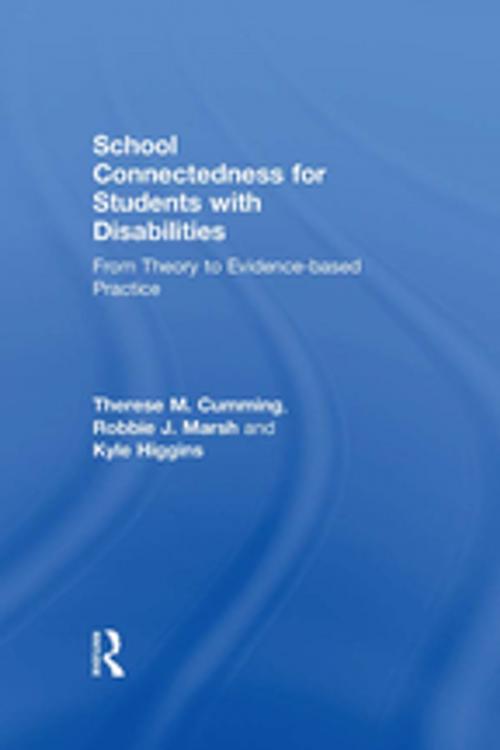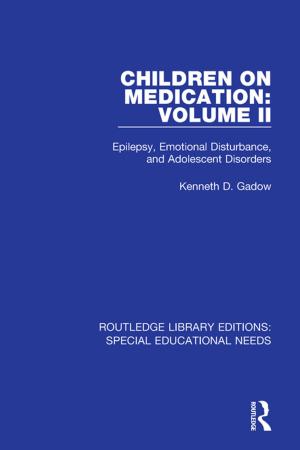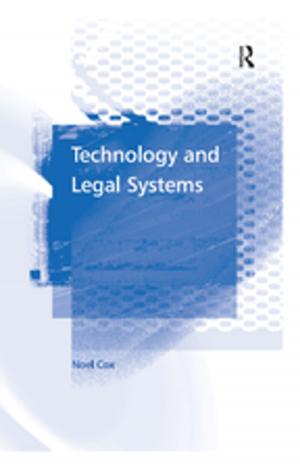School Connectedness for Students with Disabilities
From Theory to Evidence-based Practice
Nonfiction, Reference & Language, Education & Teaching, Counseling & Guidance, Special Education| Author: | Therese M. Cumming, Robbie J. Marsh, Kyle Higgins | ISBN: | 9781351623513 |
| Publisher: | Taylor and Francis | Publication: | September 5, 2017 |
| Imprint: | Routledge | Language: | English |
| Author: | Therese M. Cumming, Robbie J. Marsh, Kyle Higgins |
| ISBN: | 9781351623513 |
| Publisher: | Taylor and Francis |
| Publication: | September 5, 2017 |
| Imprint: | Routledge |
| Language: | English |
School Connectedness for Students with Disabilities: From Theory to Evidence-based Practice focuses on the importance of school connectedness for students with disabilities, and presents ways in which this sense of connectedness can be fostered. Written from a holistic perspective, it embraces a variety of approaches, strategies and interventions rooted in evidence-based theory and practice, and examines them not only in regard to the student with a disability, but also school leaders, teachers, families and community members.
The book describes and defines the concept of school connectedness, provides the reader with a theoretical framework from which to examine connectedness and explores connectedness from the lens of each of its components. It discusses the importance of assessing school connectedness in order to make data-based intervention decisions, as well as unpacking the components of student engagement, school climate, bonding and attachment. Several school-wide and leadership approaches that foster school connectedness are presented, as are ways to involve families. All of these are discussed through the lens of disability, in order to acknowledge the characteristics of disability that affect student levels of school connectedness.
School connectedness has become a priority for many schools and educators internationally. Research demonstrates the importance of connectedness as a protective factor, and its impact on the health behaviour, social, emotional and academic outcomes of young people. Grounded in theory and relevant to practice, this is essential reading for anyone interested in improving the school connectedness of students with different disabilities across the lifespan.
School Connectedness for Students with Disabilities: From Theory to Evidence-based Practice focuses on the importance of school connectedness for students with disabilities, and presents ways in which this sense of connectedness can be fostered. Written from a holistic perspective, it embraces a variety of approaches, strategies and interventions rooted in evidence-based theory and practice, and examines them not only in regard to the student with a disability, but also school leaders, teachers, families and community members.
The book describes and defines the concept of school connectedness, provides the reader with a theoretical framework from which to examine connectedness and explores connectedness from the lens of each of its components. It discusses the importance of assessing school connectedness in order to make data-based intervention decisions, as well as unpacking the components of student engagement, school climate, bonding and attachment. Several school-wide and leadership approaches that foster school connectedness are presented, as are ways to involve families. All of these are discussed through the lens of disability, in order to acknowledge the characteristics of disability that affect student levels of school connectedness.
School connectedness has become a priority for many schools and educators internationally. Research demonstrates the importance of connectedness as a protective factor, and its impact on the health behaviour, social, emotional and academic outcomes of young people. Grounded in theory and relevant to practice, this is essential reading for anyone interested in improving the school connectedness of students with different disabilities across the lifespan.















